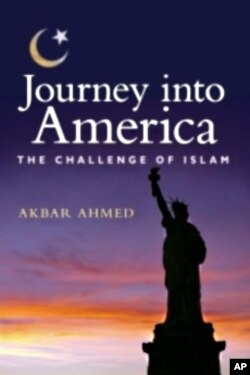Even with so many practicing Muslims in their midst, most Americans know little about the Islamic faith.
News headlines have led many people to associate the religion with violence, intolerance and terrorism, creating tensions between some Muslims and non-Muslims in the United States.
American University professor and Islamic scholar Akbar Ahmed decided to take a team of young researchers on a trip across the United States to take the pulse of the nation's Muslim community. Their findings have been published in a book and documentary titled, "Journey into America: The Challenge of Islam."
New challenges
Over the course of a year, Ahmed and his research team traveled to 75 American cities, visiting more than 100 mosques, Islamic schools and Muslim homes.
Along the way, the team conducted nearly 2,000 interviews with American Muslims, asking them to describe their experiences living in the United States.
What they found is that the deadly September 11, 2001 attacks on the United States, carried out by a band of self-described Islamists, has made life for Muslims in America more difficult.
"American Muslims are generally considered with some suspicion, with some misunderstanding," says Ahmed. "There is some controversy about Islam itself. So there is a gap, the gap existed after 9/11 and so many years after 9/11. Unfortunately, there still remains a gap."
Ahmed found that many American Muslims feel nostalgic for the days before 9/11, when they enjoyed their constitutionally-guaranteed religious freedoms with relatively little public controversy.
The change in atmosphere since the 2001 attacks has affected even young Muslim Americans in their schools.
"We had some heart-breaking stories, one story in particular about a 10-year old boy in New York. That boy told us that when he goes to school he is beaten up because they consider him a terrorist. And his mother went to Pakistan and she was killed in a bus blown up by the Taliban. So he, in a sense, was pressured by both the extremists in the Muslim world and some of the prejudices that Muslims are facing in the U.S."
Misunderstanding gap
Despite such prejudices, Muslims in the United States are still pursuing their American dreams.
Many are excel in fields like medicine, science, business and even as members of the U.S. Congress. Their success, Ahmed says, brings with it a new challenge: to work harder to educate non-Muslim Americans about Islam and to correct inaccurate and misleading portrayals of Islam in the U.S. news media.
The quest to close this gap of misunderstanding is fueled by a deep patriotic urge.
"To refer back to the founding fathers, to refer back to those extraordinary men like George Washington, Thomas Jefferson, Benjamin Franklin and (John) Adams who all reached out to people of faith from any other religion in the world, including Islam," says Ahmed.
Islam also faces challenge when Americans look around the world at majority-Muslim societies and see mostly kingdoms or dictatorships, widespread injustice and a lack of respect for human rights. That grim picture fosters a negative bias against Islam in America.
And that bias is reinforced, Ahmed says, every time there is a violent crime committed by someone in the name of Islam, like the recent lethal shooting rampage by Maj. Nidal Malik Hasan, a Muslim Army psychiatrist at the Fort Hood military base in Texas.
Finding common purpose
Toward the end of his book, Ahmed suggests one way these biases can be overcome is if Muslim- and non-Muslim Americans can find common purpose - and common benefit -- in helping to move the United States toward better relations with the Islamic world.
To do so, Ahmed says, the U.S. government first needs to develop better relations with its own Muslim citizens.
"Americans need to understand and really begin to empathize with the Muslim community in America because America is in a crisis right now on the global stage in Iraq, Afghanistan and Pakistan and the Muslims can play a very important role in acting as ambassadors between Americans and the Muslim world."
Ahmed hopes his book, "Journey into America: The Challenge of Islam," will encourage Americans from all backgrounds to see their Muslim fellow-citizens in a new and more sympathetic light, and to recognize, perhaps for the first time, that Muslims are an important part of America's rich social tapestry.













